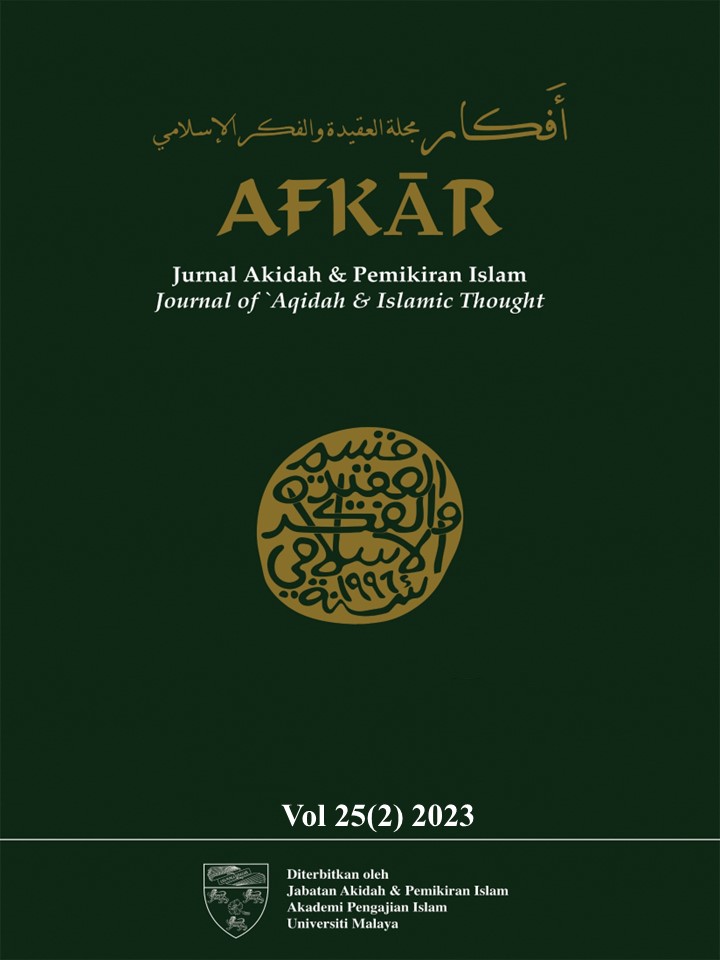The Relevance of Contemporary Epistemology on Existing Knowledge: A Critical Analysis of Western Scientific Worldview according to al-Attas Perspective
Main Article Content
Abstract
The progress of modern science and technology is considered very significant and provides convenience in every aspect. However, science has become the biggest challenge because it requires relevance to religion. The disparity between science and religion creates a dilemma, resulting in the secularization of science. This study aims to critically analyze the epistemology of Western science from the perspective of Al-Attas, which is specifically considered problematic by him. The method used in this research was content analysis, while the approach used was a critical approach. The results of this study prove that the paradigm of science is closely related to worldview. This proves that modern science and technology are not neutral and devoid of values, including religion. This has an impact on changing the way humans view and think about science and life, resulting in the deconsecration of value, desacralization, and disenchantment of nature. To map out the epistemological and Western worldview problems, al-Attas offers the Islamization of contemporary science and the epistemology of Islamic science to answer the problem of the existence of contemporary science epistemology.
Downloads
Article Details

This work is licensed under a Creative Commons Attribution-NonCommercial 4.0 International License.
References
Acikgenc, Alparslan. Islamic Science Towards a Definition. Kuala Lumpur: ISTAC, 1996.
Al-Attas, Syed Muhammad Naquib. Islam and Secularism. Kuala Lumpur: International Institute of Islamic Thought and Civilization, 1993.
Al-Attas, Syed Muhammad Naquib. Islam and the Philosophy of Science. Kuala Lumpur: ISTAC, 1989.
Al-Attas, Syed Muhammad Naquib. Islam dan Filsafat Sains Islam dan Filsafat Sains. Bandung: Mizan, 2005.
Al-Attas, Syed Muhammad Naquib. Islam. Secularism and the Philosophy of the Future. London: Mansell Publishing Limited, 1984.
Al-Attas, Syed Muhammad Naquib. Prolegomena to the Metaphysics of Islam. An Exposition of the Fundamental Elements of the Worldview of Islam. Kuala Lumpur: International Institute of Islamic Thought and Civilization, 1995.
Al-Attas, Syed Muhammad Naquib. Risalah untuk Kaum Muslimin. Kuala Lumpur: ISTAC, 1995.
Al-Attas, Syed Muhammad Naquib. The Concept of Education in Islam. Kuala Lumpur: ISTAC, 1991.
Al-Attas, Syed Muhammad Naquib. The Positive Aspect of Tasawwuf: Preliminary Thoughts on an Islamic Philosophy of Science. Kuala Lumpur: Islamic Academy of Science, 1981.
Al-Attas, Syed Muhammad Naquib. Tinjauan Ringkas Peri Ilmu dan Pandangan Alam. Kuala Lumpur: Ta’dib International Sdn Bhd., 2019.
Benboudina, Amar. “The Illustration of Progress in the Discourse of Islamic Thought.” Afkar: Jurnal Akidah & Pemikiran Islam 23(2) (2021): 489–542.
Berdiayev, N. & A. A. Shidlovsky. “The End of the Renaissance. The Contemporary Crisis of Culture.” The Slavonic Review 4(10) (1925): 1-17.
Cox, Harvey. The Secular City: Secularization and Urbanization in Theological Perspective. ed. 1. New York: The Macmillan Publishing Company, 2013.
Fathul Mufid. “Islamic Science Integration”. Qudus International Journal of Islamic Studies (Qijis) 2(2) (2014): 144-160.
Freud, Sigmund. The Future of an Illusion, trans. James Strachey. New York. W.W Norton and Company, 1961.
H. Helmiati. “Muslim Religiosity in a Challenging Secular State of Singapore”. Qudus International Journal of Islamic Studies (Qijis) 9(2) (2021): 351-386.
Hamid Fahmy Zarkasyi. “Makna Sains Islam” Islamia 3(4) (2008):
Hamid Fahmy Zarkasyi. Misykat: Refleksi tentang Westernisasi. Liberalisasidan Islam. Jakarta: INSIST, 2012.
Handrianto, Budi. Islamisasi Sains: Sebuah Upaya Mengislamkan Sains Barat Modern. Jakarta: INSIST, 2019.
Harnack, Justus. Kant’s Theory of Knowledge, trans. M Holmes Hartshorne. London: Macmillan, 1968.
Hasyim Rosnani. “Gagasan Islamisasi Ilmu Pengetahuan Kontemporer: Sejarah, Perkembangan dan Arah Tujuan.” Islamia, II No. 6. Jakarta: INSISTS, July-September 2005.
Hidayatullah, Syarif. “Epistemologi Pemikiran Sir Muhammad Iqbal”. Journal Filsafat 24(1) (2014): 94-118.
Kartanegara, Mulyahadi. Panorama Filsafat Islam. Bandung: Mizan, 2005.
Manurung, Nirwan Syafrin. “Epistemologi Islam dan Rekonstruksi Ilmu Pengetahuan Kontemporer.” Islamia Journal 12(1) (2018)
Meerasahibu, Dheen Mohamed Mohamed. “Islamic Philosophical Tradition: What Can Be Contributed to the Present and Future of Human Civilization?” Afkar: Jurnal Akidah & Pemikiran Islam 22(1) (2019): 199–250.
Mohammaddin Abdul Niri, et al. “Integration of the DIKW Model into Astronomy Based on the Islamic Science Framework.” Afkar: Jurnal Akidah & Pemikiran Islam 24(2) (2022): 99-142.
Mohd. Yusof Hussain. Islamization of Human Science. 2nd ed. Malaysia: IIUM Press, 2009.
Munsoor, Mohamed Safiullah & Che Zarrina Sa’ari. “Knowledge and Islam on the Non-Rational and Rational-Heart-Brain Inter-Connection”. Afkar: Jurnal Akidah & Pemikiran Islam 19(1) (2017): 129-162.
Muslih. Mohammad. 2008. Filsafat Ilmu Kajian Atas Asumsi Dasar Paradigma dan Kerangka Teori Ilmu Pengetahuan. Yogyakarta: Belukar.
Nasr, Seyyed Hossein. Encyclopedia of Islamic Philosophy. Vol. I. Lahore Pakistan: Suhail Academy, 2002.
Nasr, Seyyed Hossein. Man and Nature: The Spiritual Crisis of Modern Man. London: Unwin Paperbacks, 1990.
Nasr, Seyyed Hossein. The Need for a Sacred Science. United Kingdom: Curzon Press, 2005.
Naughels, David. Worldview: The History of a Concept. Grand Rapids: Eerdmans, 2002.
Qodir, C. A. Philosophy and Science in the Islamic World. London: Routledge, 1988.
Qomar, Mujamil. Epistemologi Pendidikan Islam dari Metode Rasional hingga Metode Kritik. Jakarta: Penerbit Erlangga, 2005.
Sire, James W. Naming of the Elephant: Worldview as a Concept. Downers Grove: InterVarsity Press, 2004.
Suseno, Franz Magnis. Pemikiran Karl Marx: Dari Sosialisme, Utopis ke Perselisihan Revisionisme. Jakarta: Gramedia Pustaka Utama, 2001.
Syamsuddin Arif. Orientalisme dan Diabolisme Pemikiran. Jakarta: Gema Insani, 2008.
Wall. Thomas F. Thinking Critically About Philosophical Problem. Canada: Thompson Learning, 2001.
Wan Mohd Nor Wan Daud. “An Outline of the Educational Philosophy and Methodology of al-Attas”. Journal of Islamic Research 7(1) (1993): 47-54.
Wan Mohd Nor Wan Daud. “Islamization of Contemporary Knowledge: A Brief Comparison Between al-Attas and Fazlur Rahman.” Al-Shajarah 2(1) (1997): 1-5.
Wan Mohd Nor Wan Daud. Filsafat dan Praktik Pendidikan Islam Syed M. Naquib Al-Attas, trans. Hamid Fahmy Zarkasyi. Bandung: Mizan, 2003.
Watson, Richard. Cogito Ergo Sum; The Life of Rene Descartes. Boston: David R. Godine, 2002.
Wijono, Harun Hadi. Sari Sejarah Filsafat Barat 2. Yogyakarta: Kanisius, 1980.
Yusuf Lubis Akhyar & Donny Gahral Adian. 2003. Pengantar Filsafat Ilmu Pengetahuan. Jakarta: Teraju.

